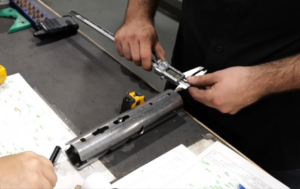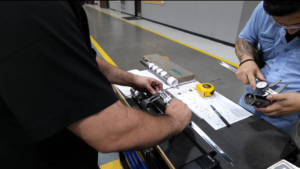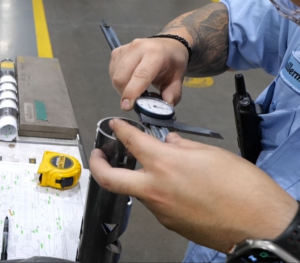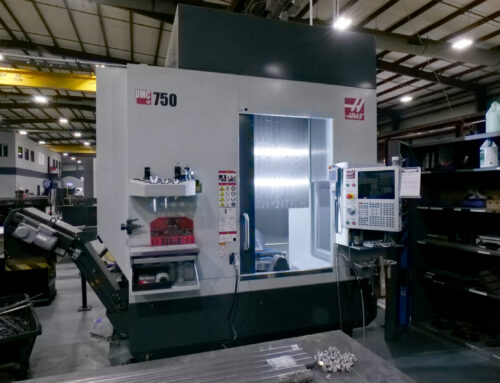Tolerances play a vital role in manufacturing design, defining the allowable variation in a part’s dimensions to ensure its functionality. However, balancing precision and managing tolerances can help reduce your manufacturing costs. By specifying tighter tolerances than necessary can significantly drive up production costs. At Ameritex, we help our customers strike the perfect balance between precision and cost-effectiveness.
By identifying which dimensions are critical to a part’s function and which are not, we can guide customers toward cost-saving design decisions. This article explores how we collaborate with our customers to achieve their goals by optimizing tolerances, showcasing our expertise in custom metal fabrication services and our commitment to delivering precision without unnecessary expense.
Machining Tolerances vs. Fabrication Tolerances
A common source of confusion in manufacturing is the distinction between machining tolerances and fabrication tolerances. These two categories reflect different processes and capabilities, yet they’re often conflated, leading to high costs or impractical expectations.
Machining tolerances typically range from +/- 5 thousandths of an inch to as tight as half a thousandth. Machined features are usually small, making such precision feasible, and measurements are typically taken with calipers or micrometers, which are capable of such precision.
precision feasible, and measurements are typically taken with calipers or micrometers, which are capable of such precision.
Fabricated components are often much larger, and achieving similar tolerances across long distances can be unrealistic or unnecessary. Measuring a large fabricated part might require a tape measure, which inherently has a tolerance of +/- 1/32 inch. Given that the measurement tool is only capable of measuring to at best within 1/32 inch, it is not possible to achieve a tolerance on the order of 5 thousandths.
This difference matters because customers may inadvertently specify machining tolerances on a part better suited to fabrication, leading to miscommunication and unnecessary expense.
Example: Laser Cutting a 1-Inch Plate
Consider a scenario where a customer needs a 1-inch thick steel plate with several holes and slots. The initial design specifies tolerances of +/- 5 thousandths of an inch, a level of precision typically associated with machining.
If we assume the part must meet machining tolerances, the only viable process is machining—an expensive and time-consuming option. However, if we consult with the customer and determine that such tight tolerances aren’t critical for the application, we can laser cut the material instead.
Laser cutting can achieve angle tolerances with a +/- 0.5-degree kerf at this thickness. While less precise than machining, it’s sufficient for many applications, particularly when holes simply need to accommodate bolts or other fittings. This alternative can reduce the cost of the part significantly, making the process more efficient and budget-friendly without compromising functionality.
This case highlights the importance of understanding the actual requirements of a part. By aligning the process with the true needs of the project, we avoid unnecessary costs while ensuring that the finished product performs as intended.
Ameritex’s Consultative Approach to Managing Tolerances
At Ameritex, we go beyond simply fabricating parts—we partner with our customers to ensure their designs are practical, functional, and cost-effective. Our consultative approach is rooted in decades of expertise in precision metal fabrication and a deep understanding of manufacturing processes.
When working with customers, we focus on identifying dimensions that are truly critical to a part’s functionality. For those that are, we select the appropriate manufacturing process to ensure that all requirements are satisfied. For those that aren’t, we can suggest alternative material choices or manufacturing processes to keep the cost down.
Our approach also extends to verifying the feasibility of specified tolerances. For instance, when working with large fabricated parts, we account for material deflection, measuring limitations, and other factors that can affect precision. This proactive attention to detail ensures that our customers’ expectations align with what’s realistically achievable in fabrication.
Managing tolerances effectively is both a science and an art. At Ameritex, we’ve mastered both through our commitment to custom metal fabrication and our collaborative approach to customer projects.
Whether you need laser cutting services, sheet metal assemblies, or other fabrication solutions, our team is here to help you navigate the complexities of tolerances, ensuring your designs are both functional and cost-effective.
Contact us today to see how we achieve the perfect balance of precision and efficiency.



